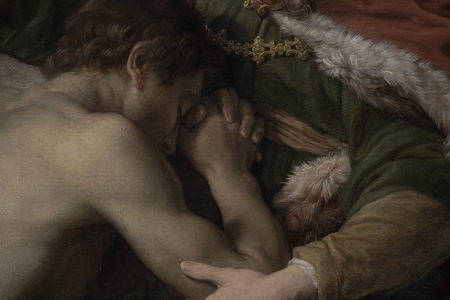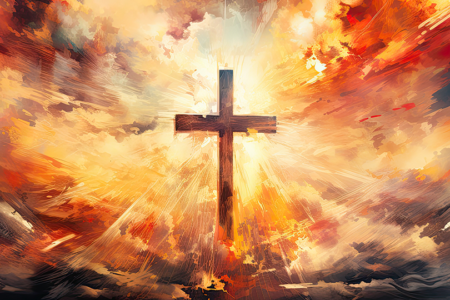Seven Minutes with The International Director Feb/Mar 1978
From the top of the Mount of Olives Jesus would have a panoramic view of the spectacular and familiar surrounding landscape. Five miles to the south and snuggled in the Judean hills lay Bethlehem – city of His birth. Nearby was the village of Bethany where He had spent pleasant moments of fellowship, with Lazarus and his sisters, Mary and Martha. The home of the parents of young John Mark, where in a few days He would eat the “Last Supper”, was less than a mile away. And the serenity of the Garden of Gethsemane beckoned in the pleasant April breezes.
But His attention that day must have been riveted westward toward the city of Jerusalem below. The massive walls surrounding the city were designed to keep the enemy out. Now, however, their gates were open wide to welcome home perhaps as many as a million of her scattered sons and daughters. It was Passover, and in obedience to the Law of Moses, they had returned to worship during the seven days of festivity. Dominating the scene, as if framed by the walls, was the enlarged and beautified second (Herodian) Temple. As the warm sun reflected off of its marble and precious metals, it stood majestically as if a silent sentinel, waiting for the return of the One whose glory in long centuries past it had housed.
Had you been on the Mount of Olives that day you would have been unimpressed by the small band of men and women who had gathered to His side. Some were Galilean Jews, unlearned and held in contempt by their Jerusalemite brethren; others were dressed in the garb of the common people – plain and simple.
In marked contrast to His followers Jesus would have drawn your attention like a powerful magnet. It wasn’t His clothing or physical features – though He was a king there was no appearance of royalty – but something . . . something inexplicable in His bearing . . . a confidence, a certainty, an assurance that somehow, some way He was in control, not being controlled by the events now beginning to rapidly unravel.
More than three years had now passed since Jesus had begun His public ministry. Central to His message was the oft repeated statement, “. . . Repent; for the kingdom of heaven is at hand” (Matt. 3:2). Inherent in that message were three interlocked parts: (1) Repentance was the one requisite for the establishment of a literal, physical, visible and political kingdom over Israel; (2) that He alone as the Son of David had the right and the power to establish such a kingdom; and (3) the oppressive yoke of the Romans over Israel would have to be broken to gain autonomy. Jewish hatred of the Romans was justified and all but universal. They were harsh, absolute rulers. The messianic hope of a deliverer was therefore deeply engraved in the Jewish heart and accentuated at Passover when deliverance and freedom were the dominant themes. In Jesus, this messianic hope, building up like a great crescendo, reached fever pitch as He stood now upon the Mount of Olives just outside the eternal city.
The command of Jesus to two of His disciples to go and get the donkey only confirmed and added fuel to the excitement and anticipation of that moment. These men were well versed in the Holy Scriptures of Israel. Immediately the words of the Prophet Zechariah would have come to mind:
“Rejoice greatly, O daughter of Zion; shout, O daughter of Jerusalem; behold, thy King cometh unto thee; he is just, and having salvation; lowly, and riding upon an ass, and upon a colt, the foal of an ass” (Zech. 9:9).
In the minds of the followers of Jesus there could have been but one thought. Now at last, He is going to lead us in rebellion against the hated Romans, and what perfect timing – there was manpower in abundance with Jews from all over the world back in the land. Now seated upon the donkey, Jesus started down the Mount of Olives, through the Kidron Valley, up the far side and through the Eastern Gate. The gathering crowds, throwing their garments and palm branches along the way, cried out, saying,
“. . . Hosanna to the Son of David! Blessed is he that cometh in the name of the Lord! Hosanna in the highest!” (Matt. 21:9b).
“Hosanna” literally means “save now” or “deliver now”. The people were quoting directly from a psalm which to this very hour is an official part of the Passover ritual.
“Save now, I beseech thee, O LORD! O LORD, I beseech thee, send now prosperity! Blessed is he that cometh in the name of the LORD; we have blessed you out of the house of the LORD” (Ps. 118:25, 26).
Their cry for salvation and deliverance at this point in time had within it no concept of His substitutionary death or resurrection – they understood none of these things. Their cry was for deliverance from the long-despised Romans and for autonomy and glory under their long-awaited Messiah.
But why did Jesus enter the Temple on this occasion? There can be but one proper response. If the kingdom was to be established, the nation must manifest the fruits of repentance. The Temple was the very heartbeat of the nation, and if that singular requisite was met, it would be evidenced at the Temple. What Jesus found were changers of money and sellers of animals:
“And Jesus went into the temple of God, and cast out all them that sold and bought in the temple, and overthrew the tables of the money-changers, and the seats of them that sold doves, and said unto them, It is written, My house shall be called the house of prayer, but ye have made it a den of thieves” (Matt. 21:12, 13).
What caused His righteous indignation? Men journeying to Jerusalem from foreign countries to worship God needed to exchange the currency of their homeland for Israeli currency. The Jewish leadership set up the “First National Bank of Jerusalem” at the Temple and were charging exorbitant rates to their brethren who had returned to worship the God of their fathers. The problem was compounded by the fact that a sacrificial animal, without spot and blemish, had to be sacrificed by each family. Jews of the dispersion, traveling great distances, could not carry animals with them – they had to be purchased in Jerusalem. The Jewish leadership went into the animal-selling business and were charging extravagant prices for “acceptable” animals for sacrifice. Is it any wonder the Lord called the Temple a “den of thieves”? As a result, the leadership despised Him and plotted His death. Men working in darkness do not want their deeds brought to light.
The singular requisite for the establishment of the kingdom was repentance – it was not forthcoming. Jesus in great sorrow said,
“ . . . If thou hadst known, even thou, at least in this thy day, the things which belong unto thy peace! But now they are hidden from thine eyes” (Lk. 19:42).
We call Palm Sunday the triumphal entry – but Jesus wept – “He came unto his own and his own received him not.” In His eternal plan, He would now become the Passover Lamb and die for the world’s sin.
Today, the Eastern Gate through which Christ entered the city that fateful day is closed. It was sealed by the Turks in the sixteenth century, when entrance through it was forbidden, and it remains closed to the present hour. A tradition that one day a Jewish deliverer would enter the city through that gate may have prompted the closing. It is fascinating that the Bible predicts the closing of the Eastern Gate:
“Then he brought me back the way of the gate of the outer sanctuary which looketh toward the east; and it was shut. Then said the LORD unto me, This gate shall be shut; it shall not be opened, and no man shall enter in by it; because the LORD, the God of Israel, hath entered in by it, therefore, it shall be shut” (Ezek. 44:1, 2).
Jesus ascended to heaven from the Mount of Olives (Acts 2:10-12), and it is to that same mount that He shall return to earth (Zech. 14:4). A second time He will descend the Mount of Olives, cross the Kidron Valley and ascend the hill toward the holy city. As Christ approaches the dual opening of the now closed Eastern Gate, the concrete will crumble before Him, and the familiar twenty-fourth Psalm will be fulfilled:
“Lift up your heads, O ye gates; and be ye lifted up, ye everlasting doors; and the King of glory shall come in. Who is this King of glory? The LORD strong and mighty, the LORD mighty in battle. Lift up your heads, O ye gates; even lift them up, ye everlasting doors; and the King of glory shall come in. Who is this King of glory? The LORD of hosts, he is the King of glory” (Ps. 24:7-10).
Passing through the gate, making a slight left turn and walking about one hundred and fifty yards, Jesus will enter the rebuilt Temple and offer Himself to the Jewish people a second time, fulfilling His words:
“. . . Ye shall not see me henceforth, till ye shall say, Blessed is he that cometh in the name of the Lord” (Matt. 23:39).
For then shall be fulfilled the words recorded by the Prophet Zachariah:
“And I will pour upon the house of David, and upon the inhabitants of Jerusalem, the Spirit of grace and of supplications; and they shall look upon me whom they have pierced, and they shall mourn for him, as one mourneth for his only son, and shall be in bitterness for him, as one that is in bitterness for his firstborn” (Zech. 12:10).
“In that day there shall be a fountain opened to the house of David and to the inhabitants of Jerusalem for sin and for uncleanness” (Zech. 13:1).
The “genuine” triumphal entry awaits the Lord Jesus Christ’s return to the planet earth and His capital, Jerusalem. Clearly, global and Middle Eastern events are moving rapidly toward this divine appointment. For Israel and her greatest Son that will be a day of indescribable glory. So, be thou prepared to “lift up your heads, O ye gates; even lift them up, ye everlasting doors, and the King of glory shall come in.”







